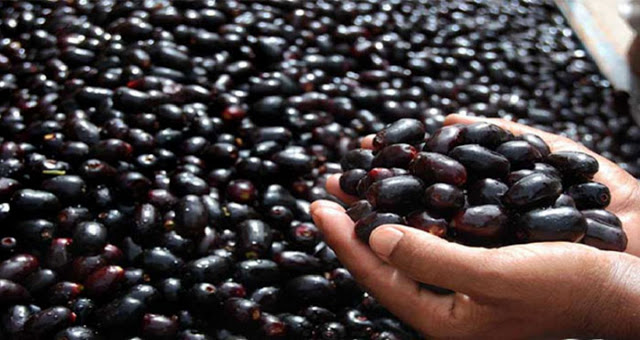The black, small, sweet, sour and astringent fruit. Green when unripe. Become red to red-black when rare ripe and full black when fully ripe. The sweetest duhat / plum are those falling on grounds. Sounds crazy but its true. Try staying under the tree and wait for falling fruits.
Health Benefits of Duhat
Read about the health benefits and uses of duhat before going under the tree:
1) Analyses of the fruit show that it is a good source of calcium and fair source of iron.
2) Burkill states that vinegar is made from the juice of the unripe duhat in Malaya. Can also be processed to popular products such as jam and juices.
3) Bark contain 19 percent tannin and 1.67 percent garlic acid. Tannin can be useful in protecting kidneys. It also has antiviral, antibacterial and antiparasitic effects. Though intake in large quantities is toxic.
4) Duhat seed was recently suggested in reducing blood sugars of diabetic individuals. It is indeed used in India. There is no harm in consuming duhat seeds however. Its taste is bland.
5) A boiled bark is a cure for dysentery, diarrhea, enema and ulcers. Can also be used as gurgle. Dried and powdered roots have the same curative effect.
6) The fruit is known to be a remedy for diabetes mellitus (the same as number 4). Leaf and bark juice is also effective alternative. Carminative, diuretic and for head ringworm removal.
7) Leaf extract is an effective poultice – a medical dressing consisting of a soft heated mass of meal or clay that is spread on a cloth and applied to the skin to treat inflamed areas or improve circulation etc.
The side effect: It will make your teeth, gums and tongue dirty – a mixture of violet and blue stain.
Antimicrobial Activity
Study of Venkata Charepalli et al (2016) entitled “Eugenia jambolana (Java Plum) Fruit Extract Exhibits Anti-Cancer Activity Against Early Stage Human HCT-116 Colon Cancer Cells and Colon Cancer Stem Cells.”
Bioactive compounds in duhat such as anthocyanins have shown potent anti-cancer effects. It selectively inhibit the growth of cancer cells with relatively little or no effect on the growth of normal cells. It clearly demonstrated anti-cancer properties not only against the early stage human colon cancer cells but also induced apoptosis and inhibited self-renewal ability.
Study published by Roja Vilar (February 2016) on Prezi.com, entitled “Anti-bacterial Activity of Duhat Leaves Extract Against Escherichia Coli.”
Duhat extract is effective on inhibiting the growth of Escherichia coli.
